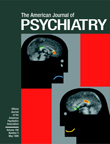Olanzapine-Induced Obsessive-Compulsive Disorder
Mr. A began treatment for schizophrenia in 1994. He received a dose of risperidone (at 3–6 mg/day) for a year. No symptoms of OCD were noted during this time. However, intensive evaluation revealed that since childhood, Mr. A had periodically felt himself driven to say obscene words. Such episodes were isolated and not a part of OCD or Tourette’s disorder, nor were they exacerbated by risperidone. In 1998, treatment was changed to a dose of olanzapine (at 15 mg/day) because of akathisia and persistent psychotic symptoms. Both disappeared, but 14 days after starting to take olanzapine, he developed a clear OCD, repeating words in his head and spending a tremendous amount of time checking doors. These OCD symptoms disappeared with fluoxetine; therefore, olanzapine treatment could be continued unchanged.Mr. B, a 27-year-old man, had been treated for schizophrenia since 1994. Risperidone was introduced after an acute episode in 1997 and increased to a dose of 8 mg/day. Five months later he was switched to olanzapine, up to 25 mg/day, because of persistent psychotic symptoms. Mr. B never previously complained of symptoms related to OCD. Within 3 months he demonstrated a clear OCD, isolating himself, washing repeatedly, checking doors and the alarm system, as well as suffering from impulsion phobias. However, he had no recurrence of psychotic symptoms. Once treated with a regimen of clomipramine, at 150 mg/day, Mr. B experienced a remarkable reduction of OCD symptoms.
References
Information & Authors
Information
Published In
History
Authors
Metrics & Citations
Metrics
Citations
Export Citations
If you have the appropriate software installed, you can download article citation data to the citation manager of your choice. Simply select your manager software from the list below and click Download.
For more information or tips please see 'Downloading to a citation manager' in the Help menu.
View Options
View options
PDF/EPUB
View PDF/EPUBGet Access
Login options
Already a subscriber? Access your subscription through your login credentials or your institution for full access to this article.
Personal login Institutional Login Open Athens loginNot a subscriber?
PsychiatryOnline subscription options offer access to the DSM-5-TR® library, books, journals, CME, and patient resources. This all-in-one virtual library provides psychiatrists and mental health professionals with key resources for diagnosis, treatment, research, and professional development.
Need more help? PsychiatryOnline Customer Service may be reached by emailing [email protected] or by calling 800-368-5777 (in the U.S.) or 703-907-7322 (outside the U.S.).

